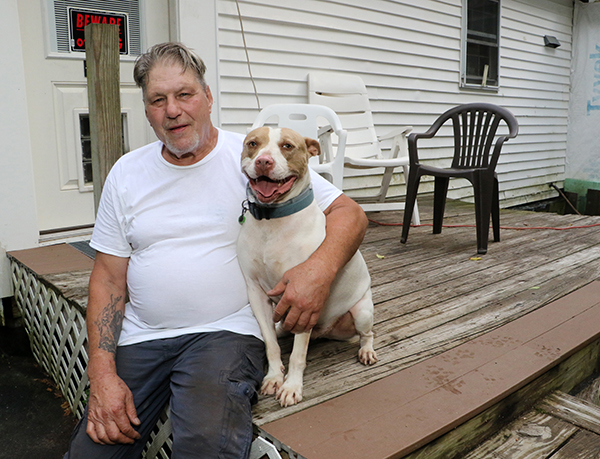
Jack and his dog in front of Jack’s house.
Jack purchased his home in the quiet woods of Middleton in May 2018 with cash, planning to stay there for the rest of his life. Shortly after buying it, he used all of his remaining money to put in new plumbing. A string of injuries and medical issues since then prevented Jack from working and earning income for the next three years.
Although Jack, a retired Marine, receives federal disability benefits, he hadn’t been able to pay his property taxes while out of work. The town obtained a tax lien; one day, a town official and local law enforcement officer appeared at the end of his driveway to tell Jack to vacate the property in a few weeks.
“I said, ‘Okay, I’ll just sell the house and pay back the taxes.’ But she said, ‘You don’t own the house anymore. We took it from you.’ And I said, ‘I have a doctor’s note to tell you what’s happening to me. I just ran into a streak of bad luck and it’s been hard for me.’ I want to pay it. I feel awful I can’t pay it.”
Jack felt overwhelmed and hopeless. He couldn’t sleep and didn’t know where to turn for help.
“I fought for this country. I paid cash for this home. How can they take this from me? I don’t understand it,” he said. He felt hopeless thinking of becoming homeless. “But I’m a fighter. I wasn’t going to take the weak way out.”
Jack’s Veterans Affairs case worker said legal aid might be able to help. A new federal program called the Homeowner Assistance Fund (HAF) was about to launch to help homeowners impacted by the COVID-19 pandemic with their mortgages, property taxes, or utility bills.
Through the HAF, NHLA and 603 Legal Aid work with the New Hampshire Housing Finance Authority to help program applicants who are at immediate threat of homelessness due to a tax deed or a foreclosure, as Jack was.
Jack was one of the first applicants to the program, and the first referred to NHLA and 603 Legal Aid. He worked with NHLA staff attorney Stephanie Bray to get a discretionary stay until his application could be approved and the town could receive the money.
“It was a race against time,” Stephanie said. “It was like a patient coming into a hospital on a stretcher, flatlined. The tax deed had already happened. The eviction notice was already served. It was really late in the game. To make matters worse, I wasn’t hearing from the town while I was also putting pressure on the HAF program to get the money freed up.”
Two days before Jack was to be evicted, the money came through and the town recorded the deed granting the home back to him. In further good news, as a senior and a veteran, Jack should be able to qualify for tax exemptions and deferrals reducing his future tax burden.
Jack remained safely housed with his dog and has storage space for his tools and equipment, ready for when he is able to return to work.
“Thank God there are people like Stephanie who help people like me. And this program being here is a huge blessing.”

